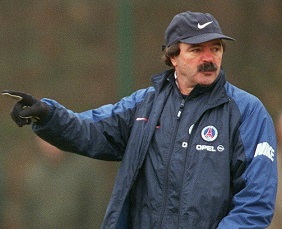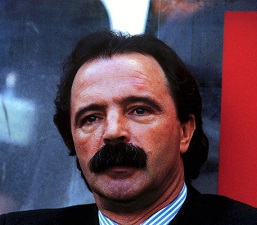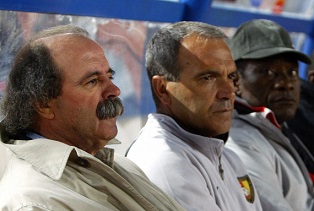 26 years ago today, Artur Jorge led Paris Saint-Germain to only their second-ever Ligue 1 title with a 1-0 win over Toulouse.
26 years ago today, Artur Jorge led Paris Saint-Germain to only their second-ever Ligue 1 title with a 1-0 win over Toulouse.
For the Portuguese coach, the French championship triumph was the culmination of three years’ work and added to his growing status as one of the continent’s most successful coaches.
First to Racing
A striker of considerable goalscoring pedigree with Benfica during a playing career cut short by injuries, Jorge’s story in the French capital as a manager actually began in 1987, when he left FC Porto having guided the Dragons to European Cup glory. A 2-1 victory over favourites Bayern Munich in the Vienna final had seen the Portuguese tactician voted European Coach of the Season later that year.
Seeking a foreign adventure, Jorge left his hometown club for Racing Club de Paris, the historic but troubled Parisian outfit hoping for a resurgence under ambitious businessman Jean-Luc Lagardère. Subsequently re-named Matra Racing after Lagardère’s conglomerate around the same time Jorge was appointed, Racing were aiming to rival the city’s new major club, Paris Saint-Germain, who had been founded in 1970 and enjoyed increasing success in the early-mid ‘80s.
Jorge’s first season with Racing saw them finish 7th while PSG languished in 15th, but the club’s familiar financial problems resurfaced and the Portuguese boss left to rejoin Porto in 1989 after a relegation-threatened second year. Racing would ultimately suffer descent to Ligue 2 the season after Jorge’s departure and were soon consigned to the amateur level of French football, where they remain to this day.
 PSG come calling
PSG come calling
After two years back at the Estadio do Dragão, Jorge returned to Paris in 1991. This time PSG came calling, following a takeover by Canal Plus and with aim of arresting a slump in fortunes toward the end of the previous decade. The team had finished 9th in the 1990/91 season, but with debts cleared and an increased new budget Jorge was charged with putting PSG back on top.
One of his first decisions in the transfer market was to advise the new bosses to raid Primeira Liga enemies Benfica for Brazilian duo Ricardo Gomes and Valdo, who both arrived ahead of a debut campaign during which Jorge led PSG to 3rd place in the standings. Spending continued in 1992, with the additions of David Ginola and George Weah adding flair to the side; the latter representing a high-profile capture from AS Monaco.
The 1992-93 campaign saw more progress as Jorge’s men finished runners-up to Marseille alongside winning the Coupe de France without conceding a single goal throughout their cup run. There was  also a memorable UEFA Cup quarter-final comeback against Real Madrid, during which PSG recovered from a 3-1 defeat in the first leg to advance with a 4-1 victory at home thanks to a last-minute Antoine Kombouare winner. Juventus proved too much for Jorge’s men in the semi-finals.
also a memorable UEFA Cup quarter-final comeback against Real Madrid, during which PSG recovered from a 3-1 defeat in the first leg to advance with a 4-1 victory at home thanks to a last-minute Antoine Kombouare winner. Juventus proved too much for Jorge’s men in the semi-finals.
Champions
Such progress left Jorge with one more step to make in his third term: over-throw Marseille and win PSG their second-ever French title in 1993-94. Spearheaded by a strike-force of Weah and Ginola (with whom Jorge had worked at RC Paris) and backed up by the flamboyant newly-acquired Brazilian Rai in midfield, Jorge’s star-studded Rouge et Bleu led the standings from October and embarked on a determined march to glory.
On Saturday 30 April 1994, the club from the capital were still less than a quarter of a century old as they took to the field at the Parc des Princes to meet Toulouse. With a six-point advantage and three matches remaining, just a point was needed under the two points for a win format. Former Benfica defender Gomes proved the match-winner with a second-half header as Jorge’s name was written into club history.
Globetrotter
At the age of 48, Jorge had captured his tenth major trophy and achieved international success with one of Europe’s most fashionable new clubs. Indeed, with a reputation in France for putting results over style and a controversial history of stoking the flames of aggression ahead of the Classique derby matches with Marseille, the man with university doctorates in philosophy and German philology was treading a path highly comparable to that strutted by José Mourinho 20 years later.
Yet after deciding to leave Paris following the league triumph, Jorge’s managerial career struggled to live up to such accomplishments. Portuguese champions Benfica, where he had won four league titles and twice been top goalscorer as a player, tempted him back home but his tenure in the capital lasted just a season as the Eagles slumped to a 3rd place finish and ended up 15 points behind  Porto.
Porto.
Disappointing national team stints followed: firstly with Switzerland, for whom Jorge was regarded by the public as an underwhelming successor to Roy Hodgson, then Portugal where a failed qualification campaign for World Cup 98 meant the spell was equally memorable for an incident during which ousted forward Sá Pinto travelled to the squad’s headquarters and floored the Seleção boss in an argument over his omission. Sa Pinto received a lengthy ban; Jorge was to pay for the team’s shortcomings with his job after just a year at the helm.
A multi-lingual man with a curiosity of cultures, Jorge took in many countries during the remainder of his coaching career. Stints in Spain, the Netherlands, Cameroon, Russia, the Middle East and Algeria followed – as did a brief return to PSG in 1998 – while Académica de Coimbra was a landing spot for a spell back in domestic Portuguese football.
Exclusive bosses list
Although unable to replicate the heights of his early success, Jorge’s Saudi Arabian Premier League title win with Al-Hilal in 2002 sees him on an exclusive list of Luso bosses to have been crowned champion in three different countries. Jesualdo Ferreira, Vítor Pereira and José Mourinho make up the 4-man list, with Mourinho and Jorge appropriately given distinction for their continental trophies.
Five years since his last job, Jorge, now 74, has settled into retirement with a typical unwillingness to attract media attention. Having once stated his preferred way to follow football on TV is to watch with commentary turned off and classical music playing, Jorge is unlikely to covet the limelight from here on.
Nevertheless, his achievements on the bench will ensure Artur Jorge will forever command some of the greatest pages of football history in Porto and Paris.
By Sean Gillen

